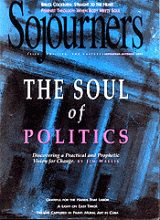Indonesia’s brutal 19-year occupation of East Timor has caused the deaths of one-third of the island’s population—some 200,000 people—and shows no sign of letting up soon. Yet for most of the world, East Timor still seems too distant a tragedy to be troubled about—especially in light of similar but better publicized brutalities that make the evening news.
But its invisibility isn’t simply because of lack of concern. Indonesia has waged a well-orchestrated international public relations campaign to block information of the Timorese genocide from reaching much of the world. Only the most horrific atrocities—such as the Santa Cruz Cemetery massacre in 1991 where at least 200 Timorese protesters were killed—get covered by the mainstream media. Meanwhile, much of the Timorese population continues to be confined to concentration camps, its culture threatened by Indonesia’s efforts to repopulate the island with Javanese settlers.
Indonesia uses its powerful influence in the Southeast Asian community to cover up its actions in East Timor. Recently it all but blocked the Asia Pacific Conference on East Timor (APCET) held in Manila by threatening to pull its extensive investments out of the Philippines and to end talks it was mediating between Manila and Filipino Muslim insurgents. And although the Filipino government bent to the pressure and banned a number of well-known human rights activists from attending the meeting, Indonesia’s interference in ACPET in time backfired and served to focus international attention on its East Timor policy.
Read the Full Article
